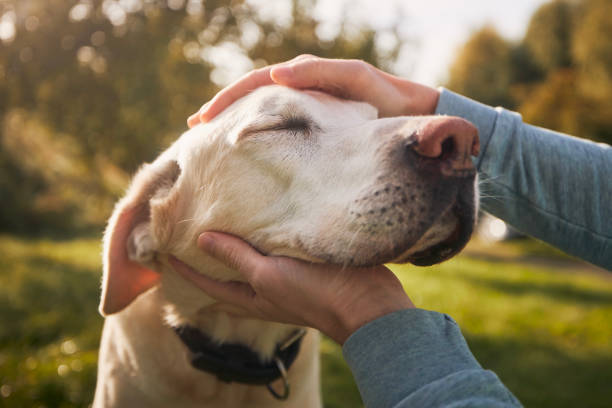Understanding Dog Behavior- The great amount of excitement that comes with adopting or buying a pet dog also comes with many responsibilities. You really have to become a caring parent to your new pet child. Besides the initial training and common food queries that trouble our mind, your mind gets puzzled by abrupt mood shifts or unusual behaviors demonstrated by your dog.

One of the most important rules of a new and quality relationship is “developing an understanding”. Dogs are no exception!
Understanding Dog Behavior- Here, I will familiarize you with some tricky dog behaviors and their causes so you can better connect with your cute little pet child. Fun doubles once you begin to understand your companion.
1. Skipping Meals-Understanding Dog Behavior
Understanding Dog Behavior- Being a new Pet-parent can be a hell of a job! Selecting the best dog food and ensuring that your dog is gaining enough nutrients is one of the first steps.
But what if your dog begins to skip meals? Even though few dogs love to munch on food all the time, but some may like to eat less and skip dinner. Few dogs eat less on hot summer days, and others may refuse to eat only to have their favorite meals all the time. It may be feeling a stomach ache. So, it’s entirely normal. However, you need to consult a vet if your dog continues to skip meals.
2. Excessive Skin Scratching
Understanding Dog Behavior- You might have seen other pets commonly scratching themselves, but it’s something that we should not ignore as dogs face a variety of skin problems.
Firstly, understand that the dog is not allergic to the food or any supplement you are feeding. Then, dig deeper into the proper nutrition needs of your dog.
Secondly, find out if your dog is allergic to grass or smoke, or any other environmental factor.
Thirdly, look for fleas or ticks in the coat fur of your dog because they commonly trouble dogs.
Once you rule out these three factors and still the problem persists, get an appointment with your vet. Dogs often get viral, bacterial, or yeast skin infections and allergies.
Related Post: Bulldog Dog Breed Information
3. Aggressive/Shy Behavior
Understanding Dog Behavior- Aggressive behaviors are usually associated with environmental stimuli, but that’s not always the case. For example, dogs can be aggressive because of their genetically inherited trait. So, keep the fact at the back of your mind. If all else fails, just accept the behavior and stop reacting.
Shyness isn’t always due to environmental stimuli of being bullied or aggressively treated. Instead, shy behaviors are often caused due to age factors, that is, adolescence period at 12 to 18 months of age or growing-up time span of 4 to 6 months of age.
4. Dominating Behaviors
Understanding Dog Behavior- Dogs that sit at high places, pull at the leash, try to lead you, or enjoy your sofa without your permission are misinterpreted into the “trying to dominate” category. Instead, they are reflective of what we are giving them. So, get flexible and fun-loving during the training process to make them comfortable with you. Use positive reinforcements for desired behaviors all the time. Not big trouble, so cheers!
5. Separation Anxiety
Understanding Dog Behavior- “Dogs are pack animals” is an oft-repeated and highly-emphasized fact. So, separation from the owner or other dogs creates anxiety in them. Leave them infrequently at first and for shorter periods so that they understand your routine of ‘always coming back. Yes! Once they are trained to wait for you, they will learn to engage themselves.
Understanding Dog Behavior- However, keep the difference between true separation anxiety and simulated separation anxiety (which dog adopts only to get your attention). In the former case, give them proper time to play and long walks and socialize them with other dogs and people. Avoid getting them habitual to crowds because that will aggravate the situation once you leave your home. In the latter case, try to say ‘no’ to their simulated pleads.

6. Inactivity
Understanding Dog Behavior- Dogs need regular physical exercises like chase-it or go-fetch games, running on tracks, and long walks to parks to socialize and move around. Mental exercise requires them to learn new tricks, find their food, or gather the mess they created. If your dog isn’t responding to both stimuli of exercises, they may be suffering from some health issue. If not, then just keep them busy hunting for stuff.
7. Barking
Understanding Dog Behavior- For new pet parents, developing an understanding of the reason behind dog barking can get tricky initially. They may bark to get your attention or when there’s a danger or when they are hungry, or when they want to play. They communicate with you their emotions, and misinterpreting or ignoring them at such moments is never a good idea. However, paying attention to them every time they bark may positively reinforce them to ‘always get your attention easy way out. Unfortunately, it can get irritating at later stages.
So, draw some lines in the beginning and be consistent in your behaviors with the new dog-child. Then, understand, accept and have more fun each day with your lovely pet.
Conclusion
Understanding Dog Behavior- Although it may be challenging to deal with a pet dog’s mood swings and occasional naughty behaviors, the unconditional love they shower us with is worth all the effort. We hope this article has helped clear some of the queries that were troubling your mind about owning a pet dog and provided solutions to them. Thanks for reading!
Additional Read:
How Long Do Dogs Live – Does Their Food Affect Their Life Span?
Dog Eye Infections, Dog Eye Problems, Dog Eye Diseases
A Short List of Top Hypoallergenic Dogs
Dog Biting People – How to Prevent?
Smells in Dogs and How to Get Rid of Them?
Ibuprofen for Dogs — Dog Pain Medications
Choosing The Perfect Bed For Your Dog
A Reflective Dog Vests Has Saved My Pet’s Life
My Dog is Scared of Everything all of a Sudden
Golden Retriever Puppy Checklist
Guard Dog Training and Barking Despotism
Change Your Dog’s Food With These Five Brands
Learn Body Language to Train Doberman Pinschers
Dog Parenting Tips – How to Stop Excessive Barking in Dogs?
Tips About Attack Dog Training You Need To Know
Dog Food Reviews, Ratings and Guideline
6 reasons that the pit bull you’re afraid of isn’t the dog that’s going to bite you
Agility Dog Training — Type of Agility Dog Training
POTTY TRAINING – THE REAL STORY OF MY BABY
Hill’s Presciption Diet R/D (Dry)
Hill’s Prescription Diet CD Canine
Purina Moist and Meaty Dog Food (Semi-Moist) – The Honest Review
Build A Relationship With Your Dog
Dog Care Tips and Dog Food Reviews
10 tips for travelling with dogs
HAPPY NOT TO BE HAPPY IN SAYULITA
A Brief description of Toy Poodles
8 Helpful Tips for Keeping Your Dog At a Kennel
Clingy Dogs: Is Your Dog a Velcro Dog?
Why Dog Ramps are Perfect for Pets with Disabilities?
Dog Clothes for the Upper Class
ASPCA® Partners with IBB Group of Companies for Unique Jewelry Collection
How to Keep a Dog from Digging Under the Fence
Tips For Dog Obedience Training
The Right Way To Train Your Dog
Dog Frisbee — a favorite game of dogs and their owners
Dog Beds — What Kind of Dog Beds Does Your Dog Really Need?
Funny Dogs That Can Entertain You
Dog Health Tips: How Do You Tell If a Dog is Sick?
A Brief description of Toy Poodles
